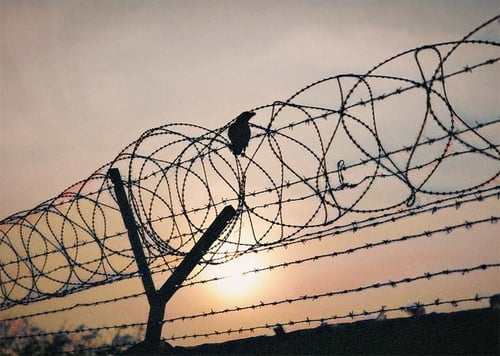
The first of the future EU border prisons
A report by Amnesty International in collaboration with NGO Samos Volunteers lays out a systematic disregard for asylum seekers' well-being on the island. Thousands of people remained in the de facto detention center with lacking access to water, basic hygiene, and necessary medical services.
Adriana Tidona who worked as a migration researcher on the report told The European Correspondent that the EU funded so-called Closed Control Access Centres (CCACs) in Greece to replace ”the older, mainly tent-based camps”, after fires destroyed the Moria camps in Lesvos.
”Whereas previous facilities were open camps, these facilities are what they say in their name: closed controlled facilities that restrict people's movement and liberty much more, and in the case of Samos, they are de facto detention”, says Tidona.
Greece has a restriction of freedom clause which allows authorities to hold asylum seekers for up to 25 days at their facilities. While 'detention' isn't in the name, the conditions that people were kept in amount to nothing less.
The CCAC in Samos was at times heavily overcrowded, had water shortages, no permanent medical doctor, and no medical staff providing sexual and reproductive care. ”You cannot pretend that people are received in line with European standards when they don't even have basic medical services”, Tidona added.
On top of that, the 25-day limit was exceeded repeatedly. According to Tidona, ”Sudden inflows of people pressure the already understaffed and under-resourced registration system, those proceedings exceed 25 days quickly.”
The EU's role
The EU invested €276 million into the CCACs. Amnesty International had hoped that with Europe's renewed funding the new facilities would be up to European standards. Instead, however, they saw ”increased containment of people on the islands.”
To oversee what happens on the ground, an EU task force was set up for CCACs. In Samos, the task force operates intransparent. This is not news to the European Commission, who investigated the issues on Greek CCACs since January 2023.
Amnesty International's report was not the first time that the CCAC in Samos was highlighted as a problematic case of EU migration policy. A report by the Committee on the Prevention of Torture (a Council of Europe body) outlined a similar picture after a visit in November 2023, and was met with inaction.
In addition, this is only what we can observe on EU borders. The increased externalisation of EU border management means that governments with track records of human rights abuses are given more EU funding to 'manage migration' before asylum seekers even step on EU soil.
What now?
The issues in the report extend beyond Samos. Greece has been defined repeatedly as a ”testing ground” for European policies, and under the new Migration and Asylum Pact these tests can become a more permanent reality. New mechanisms outlined in the Pact, particularly the new screening, border asylum, and crisis procedures, allow for more detentions and restrictions of freedom by authorities.
How can authorities be held to account to avoid another Samos?
Marta Selvatico and Dalia Impiglia from Samos Volunteers who worked on the report told The European Correspondent that ”We can't force them (the European Commission and Greek authorities) to respond the way that we want them to answer. The only thing we can do is allow space for the voices of the people actually affected.”
Detained asylum seekers produced artworks to create personal and visual testimonies of the conditions that they were facing. ”A lot of the artworks picture the barbed wire”, Selvatico added, ”which goes to show just how heavy that kind of establishment is. After such long journeys, people get greeted in Europe by that.”
Of course, this does not have to be the case. The EU is aware of the gravity of the situation, and probes into the conduct on the ground in Greek migration facilities have been underway for a while. Yet, as of now, the EU spends millions on lost potential in Samos, as Tidona argued: ”Greece could also be a testing ground for how to do things right.”